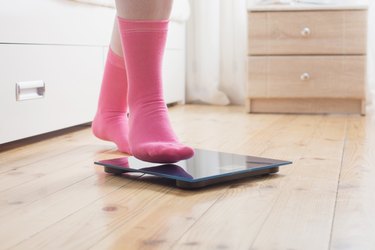
If you're looking for weight-loss exercises specific to people over the age of 50, we have some good news and some bad news. We'll start with the bad...
A May 2015 JAMA study shows that almost half of people over 60 years old have metabolic syndrome, meaning they're at a higher risk for heart disease, stroke and diabetes.
Video of the Day
Video of the Day
The good news? You can absolutely prevent metabolic syndrome, and "it's never too late to start exercising," says Caley Crawford, director of education at Row House, a boutique fitness studio with locations nationwide. "We have middle-aged people come into our studio who have never worked out, and within four months they're rowing a half-marathon."
That said, there are some challenges to getting your fitness groove on after the age of 50: Both women and men experience age-related loss of lean tissue at this age, resulting in a slower metabolism and increased body fat.
Read more: The Best Core Exercises for Older Adults
That's why your main goal should be to focus on doing whatever you can to maintain and build muscle. This will not only improve your metabolism but it will set your body up for aging as healthfully as possible.
Here, the four categories of exercise you need to stay healthy and fit at any age, plus how often you should do each type of workout.
Walking
Not only is walking a convenient way to lose weight since you don't need to belong to a gym or invest in special equipment, it's also an ideal exercise for older adults since it's gentle on your joints and will help keep your heart and bones strong. A 155-pound person burns 149 calories when walking at a slow pace (3.5 mph) for half an hour, according to Harvard Health Publishing. Increase the pace to 4 mph, and the same person burns 167 calories.
Of course, running burns more calories in the same amount of time, but walking is an approachable, low-impact workout that works for most people. (Bonus points for walking in nature: Spending time in the outdoors has a ton of physical, social and emotional benefits.)
Tip
For consistent weight loss, you’ll need to clock in at least 20 minutes of brisk walking most days of the week.
Lifting Weights
Lifting weights not only helps you burn fat, but it also amps up your ability to perform such daily tasks as carrying groceries, climbing stairs and doing other household chores. Lifting weights is critical since all of us lose one to two percent of our muscle strength each year, according to a December 2013 Journal of Physical Therapy Science study.
"Resistance training with free weights is critical to losing weight," says Lynn Montoya, an ACE-certified trainer and owner of Lynn Montoya Fitness in Orange County, California. "Plus, strong leg and hip muscles reduce your risk of falling, a cause of considerable disability among older adults."
For lifting newbies, Montoya suggests strength training a minimum of two times a week, with workouts being split between upper-body exercises one day and lower body the other. Tip: Skip the resistance machines and keep increasing the weight you're lifting as soon as it becomes easy.
Read more: Free Weights Routine for Beginners
"A lot of older people tend to only use resistance machines, but I recommend using free weights because they require balance and they promote more activity of the joint stabilizer muscles," says Montoya.
Yoga
Not only does yoga strengthen your muscles but it also increases your flexibility. Another perk: Stretching and breathing deeply during yoga helps to reduce stress hormones that contribute to belly fat, a common problem for anyone over 50. And since yoga reduces stress levels, it also has the potential to improve your overall eating habits (less stress eating!), encouraging weight loss.
Indeed, a November 2016 Journal of Clinical & Diagnostic Research study shows that men lost fat when they committed to a 14-week yoga program. The people in the study practiced yoga five days a week for 90 minutes — but don't worry, every little bit counts.
Interval Training
If you're up for it, high-intensity interval training (HIIT), which is any workout where you alternate between intense activity and less-intense activity will help you burn more calories. It's also one of the most effective ways to lose weight, provided you have your doctor's permission for strenuous exercise.
"The best HIIT activities for older people just starting out include swimming and cycling," says Montoya. "By doing somewhat hard intervals followed by easy intervals, you'll see significant improvements in your aerobic fitness, strength and blood-pressure readings."
Montoya suggests these intervals for the best results: Five minutes of brisk walking, followed by five minutes of casual walking; three minutes on, three minutes of rest; one minute on, one minute of rest — and repeat. You can follow the same pattern on the bike or in the pool. Start with a 30-minute interval workout three days a week and work up from there.
Read more: Swimming Pool Exercises Using an Aqua Noodle
- JAMA: "Prevalence of the Metabolic Syndrome in the United States, 2003-2012"
- Journal of Physical Therapy Science: "Balance Improvement by Strength Training for the Elderly"
- Journal of Clinical & Diagnostic Research: "Yoga Practice for Reducing the Male Obesity and Weight Related Psychological Difficulties-A Randomized Controlled Trial"
- Harvard Health Publishing: "Calories Burned in 30 Minutes for People of Three Different Weights"
Was this article helpful?
150 Characters Max
0/150
Thank you for sharing!
Thank you for your feedback!